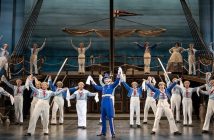I owe my appreciation of opera to the actor Tom Hulce. If the name doesn’t immediately grab you, he played the lead in Milos Forman’s seminal and multi oscar-winning film, Amadeus. At thirteen, a canny music teacher jump-started my interest in classical music by showing this film over the first few lessons of his at school. Hulce’s performance as the prodigious, infantile composer was captivating and the film made the world of opera inviting, accessible and filled with wonder. My appreciation was piqued. And it began with The Abduction at the Seraglio.
Now, some (ahem) twenty-plus years later, I feel as if I’ve come as close as I could to being at a vision of the opera’s opening in Vienna that evening in 1782. The inimitable David McVicar – maestro of staging of Mozart – has brought us Die Entführung aus dem Serail (to give it its German title), in its contemporary staging, and at Glyndebourne. What more could one ask for.
It’s set, as we are so delightfully informed in Forman’s film, in a Pasha’s harem, in Turkey. Our hero Belmonte’s sweetheart, Konstanze, along with her English maid and his valet, Pedrillo, have been captured by pirates and sold as slaves to the Turkish Pasha, Selim. Belmonte and Pedrillo, once reunited outside the palace, concoct a plan to steal inside and abduct their maidens to freedom. It’s straightforward Mozart, set at a time when the Orient was in fashion but still largely unknown, and principally about the different attitudes and interplays between cultures and personalities towards love and its misgivings.
And therein lies its interpretive idiosyncrasies, heightened by McVicar’s production. For in this production it becomes clear that the hero is anything but heroic. In fact, he’s a bit of a wuss, a fop, mawkishly fawning over Konstanze like a lovesick teenager. Even by operatic standards. The real man is the Pasha; patient, solicitous and passionate. My companion to the performance remarked after the famous scene where Konstanze refuses him, here played for all its sexually-charged gusto in the Pasha’s bedchamber, “She’s clearly going for the wrong man.” Either that or it was Franck Saurel’s ripping torso, as tight as a tuning fork, that prompted her comment.
The drama aside, Die Entführung is first and foremost a singspiel, a comic opera, perhaps more closely associated with our modern musical. Exposition is spoken, not sung in recitative, with, in fact, the Pasha’s entire part delivered in speech. It could be argued that this was a deliberate means to distinguish the differences between Turkish and European and, certainly, heightens the drama when the Pasha is at his most inflamed but, as was intended, it’s the comedic element that works best. Brenden Gunnell’s Pedrillo’s timing is impeccable, his nuances genuinely funny; similarly, Norwegian Mari Eriksmoen, as Blonde, is delightful in her scene with slave master, Osmin. The tonic clarity of her voice complimented by Tobias Kehrer’s rich textured bass – a scene-stealer in this production – makes for a mesmerising duet, made all the better by the comic interplay as they scrap through the kitchens. And all this set amid designer Vicki Mortimer’s striking Ottoman spectacle.
The first time I was to see Die Entführung since that taster in the film was, joyously, in Salzburg, at the Landestheater, in German. With no subtitles. It didn’t matter, from the opening bars and the thump of bass and cymbal, I was transported and watching this opera as it was intended; set in the period, in a small theatre, a frisson of enjoyment bristling through the audience. The performances were mesmerising, the drama compelling, the comedy worked and it made what it was meant for; a jolly good night out.
And so it was at Glyndebourne. Just with black ties.
Die Entführung Aus Dem Serail runs on selected dates at Glyndebourne until 10th August 2015. For more information, including details of the 2015 season, and to book tickets, visit www.glyndebourne.com.
A special live performance will be screened at cinemas across the UK, and broadcast live online, on Sunday 19th July. Details are available on the website.




